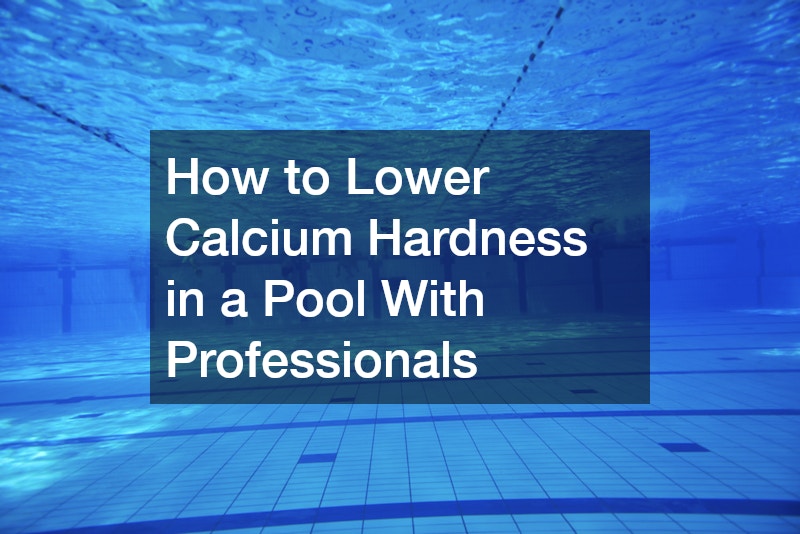Maintaining optimal calcium hardness levels in pools is crucial for the longevity and performance of the pool structure and equipment. Professional pool services offer a credible solution to managing and rectifying calcium hardness issues proficiently. Continue reading to learn how to lower calcium hardness in a pool with help.
Why is Calcium Hardness Important in Pool Maintenance?
Understanding Calcium Hardness
Calcium hardness refers to the concentration of calcium dissolved in pool water, contributing to the overall water hardness level. It is a critical component of pool chemistry that affects the stability and comfort of the water.
Proper calcium hardness ensures that the pool surface and equipment are protected against corrosion or scale formation. Professionals emphasize maintaining a calcium hardness level between 200 to 400 ppm to safeguard the pool’s structural integrity.
Without appropriate calcium levels, swimmers may experience discomfort, and pool surfaces might face deterioration. Recognizing its importance, pool maintenance services utilize specialized techniques to monitor and adjust these levels, helping raise or lower calcium hardness in a pool.
Impacts of Excessive Calcium Hardness
High calcium hardness can lead to scaling on the pool surfaces, clogging filters, and reducing the efficiency of heaters. This not only affects the aesthetic appeal but also the functionality of the pool’s filtration system.
Moreover, excessive levels can make the water appear cloudy and feel rough against the skin, diminishing the swimming experience. Professional intervention becomes essential when these issues arise, as they possess the expertise to restore balance.
Unchecked, high calcium hardness can result in costly repairs and maintenance down the line. Engaging professionals is a preventative measure against such unnecessary expenditures.
How Do Professionals Test Calcium Hardness Levels?
Methods of Testing
Professionals employ a variety of methods, such as colorimetric titration, which provides precise measurements of calcium hardness. These tests are often conducted on-site, ensuring immediate and accurate results.
Digital testing kits are also popular due to their ease of use and consistent accuracy. With these tools, professionals can quickly determine the calcium hardness levels and devise appropriate treatment plans.
Regular testing helps in the early detection of imbalances, preventing the escalation of potential issues. This proactive approach is a testament to the efficiency of professional pool maintenance services.
Choosing the Right Testing Tools
The accuracy of calcium hardness testing relies heavily on the tools used by professionals. Selecting high-quality, well-calibrated testing kits is paramount for reliable results.
Advanced testing tools allow for consistent monitoring, ensuring that the calcium levels remain within the desired range. Professionals are trained to use these tools effectively, contributing to the overall safety and maintenance of the pool.
Investing in the right tools showcases the commitment of service providers to deliver exceptional quality and service. For this reason, many pool owners turn to professionals for their maintenance needs.
What Techniques Do Professionals Use to Lower Calcium Hardness?
Water Replacement Strategies
Partial draining and replacing pool water is a common technique used by professionals to lower calcium hardness. This method involves calculating the precise amount of water that needs to be replaced to achieve balance.
By eliminating some of the overly hard water and refilling with softer water, professionals effectively reduce calcium concentration. This strategy is both straightforward and efficient for managing high calcium hardness.
Professional services ensure that this process is conducted safely, preventing any damage to the pool structure or disruption to its chemistry. This level of care is why many pool owners trust experts for water replacement tasks.
Chemical Treatment Options
Chemical treatments, such as the use of sequestrants, are another approach used by professionals to manage calcium hardness. These chemicals bind with calcium ions to prevent them from forming scale.
Professionals are adept at adjusting chemical concentrations to effectively reduce calcium levels while maintaining overall water chemistry balance. This expertise ensures the pool remains safe and enjoyable for use.
Chemical treatments are tailored based on specific pool conditions, making professional oversight invaluable. Proper dosing and application minimize risks, further emphasizing the benefits of professional involvement.
How to Prevent Calcium Hardness from Increasing Again?
Routine Pool Maintenance Tips
Establishing a consistent maintenance routine is crucial for preventing high calcium hardness levels. Regular cleaning and balance checks help in catching subtle changes before they develop into larger issues.
Professionals advocate for the routine adjustment of chemical levels, which aids in preserving water quality and pool longevity. By following these maintenance tips, pool owners can enjoy a hassle-free swimming experience.
Routine professional checks complement personal maintenance efforts, ensuring comprehensive care. This collaborative approach makes managing calcium hardness straightforward and effective.
Optimal Water Balance Strategies
Maintaining the correct balance of pool chemicals, including pH, alkalinity, and sanitizer levels, is vital for controlling calcium hardness. Professionals provide guidance on the ideal chemical ratios to preserve water quality.
By doing so, they help prevent conditions that lead to calcium scale formation. Balanced water chemistry is a cornerstone of effective pool maintenance, achieved through professional expertise and advice.
Taking proactive steps with the guidance of experts ensures that pools remain inviting and free from the adversities of calcium buildup. This ongoing commitment to balanced water underscores the importance of professional services.
When Should You Consult Professional Pool Services?
Signs You Need Professional Help
Visible scaling, cloudy water, or inefficient filtration systems are clear indicators that professional intervention is necessary. These symptoms, if they persist, can lead to bigger issues that compromise pool safety.
Regularly experiencing chemical imbalances despite personal maintenance efforts suggests the need for professional assessment. Professionals possess the skills and tools to identify root causes effectively.
Choosing the Right Pool Service Provider
Selecting a reputable pool service provider involves evaluating their experience, client reviews, and service offerings. A provider with a proven track record will more likely deliver high-quality results.
Consider a provider’s expertise in dealing with calcium hardness and inquire about their methods and tools used. A knowledgeable service provider will happily explain their processes and answer any pool-related concerns, besides being able to lower calcium hardness in a pool.

